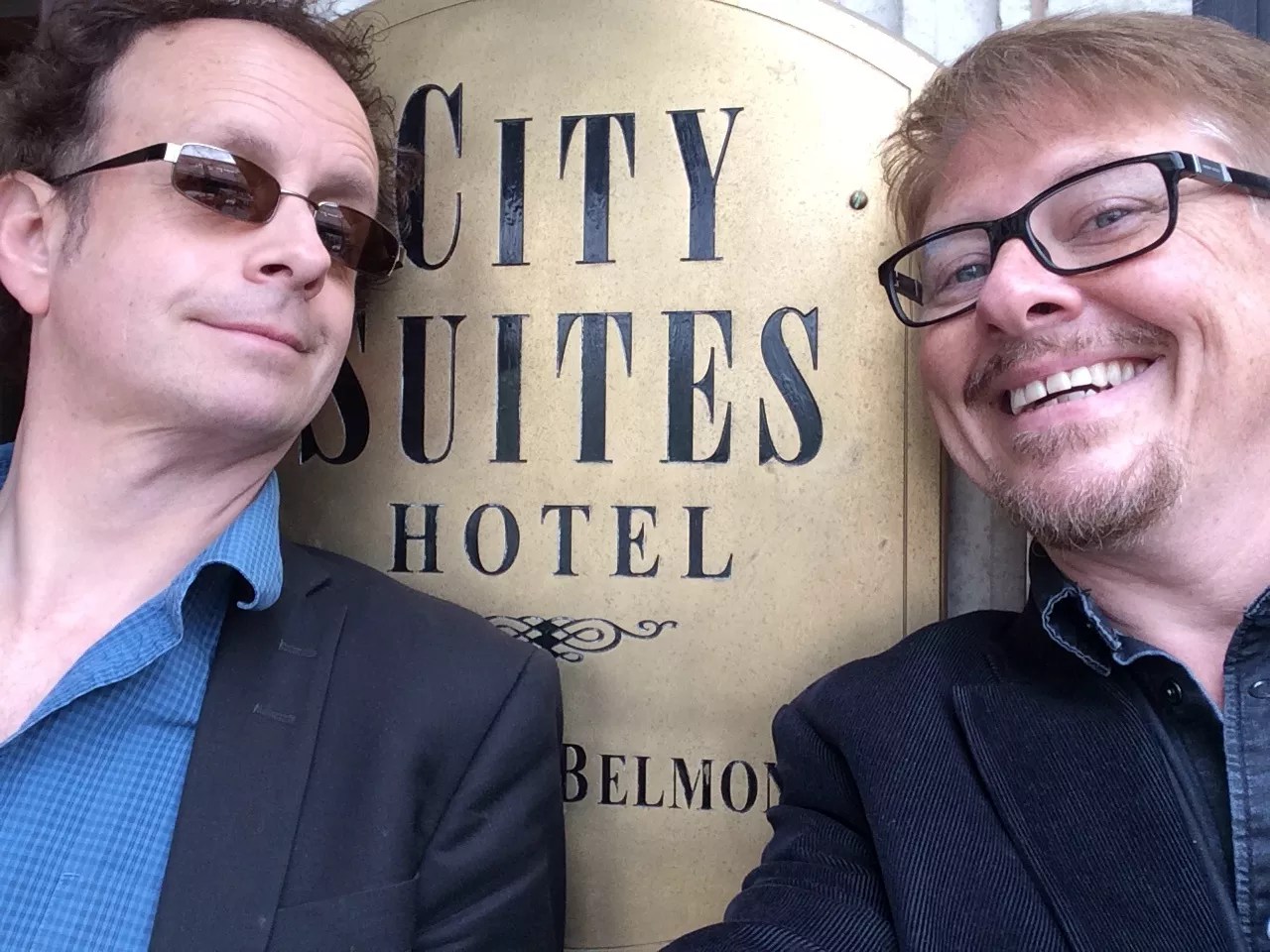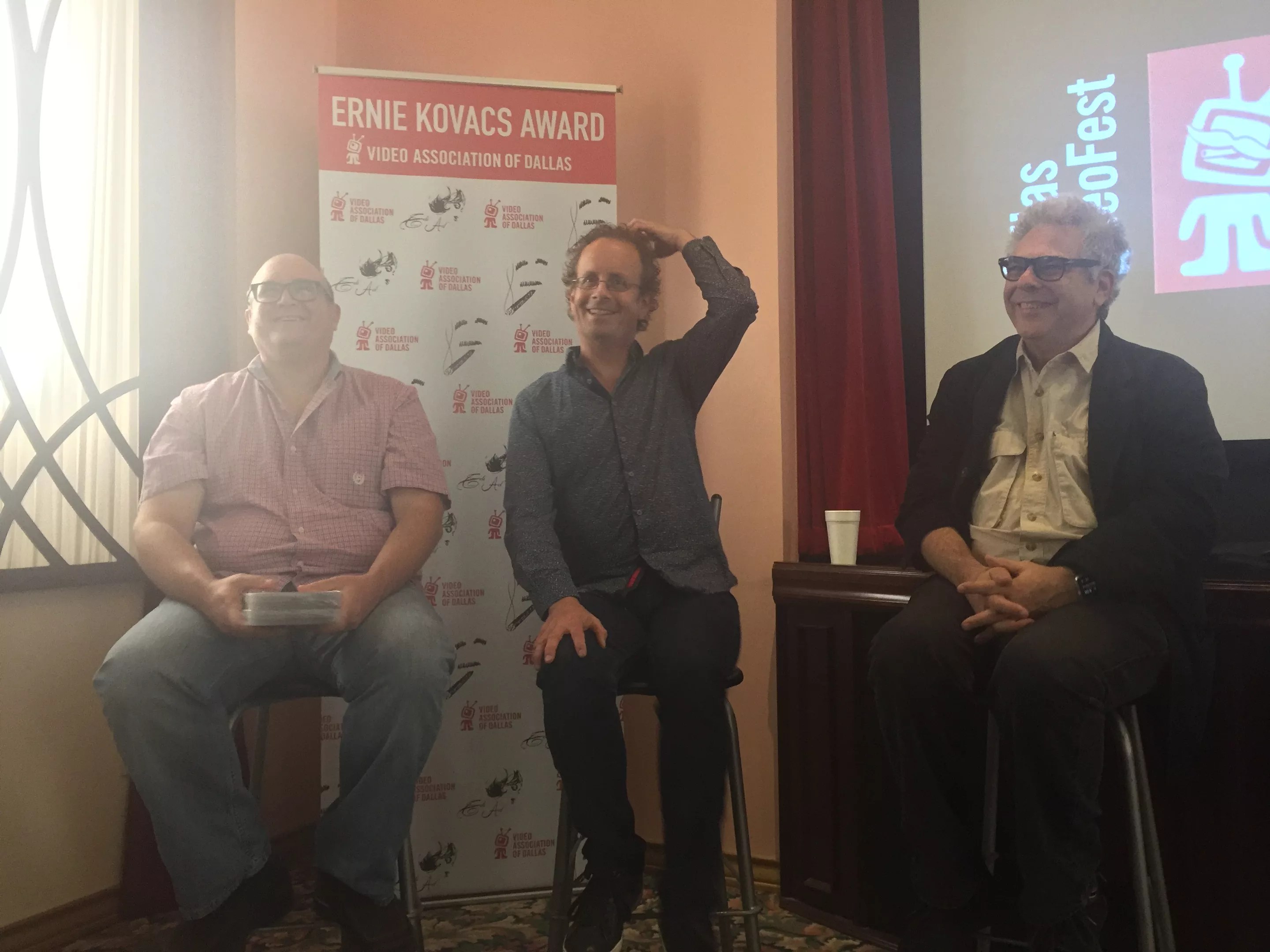
Courtesy of Dallas Videofest

Audio By Carbonatix
It’s been nearly 30 years since the Canadian sketch comedy show The Kids in the Hall first went on the air and almost 35 years since troupe members Kevin McDonald, Dave Foley, Mark McKinney, Scott Thompson and Bruce McCullough first shared a stage together under their troupe name.
They continue to tour every couple of years – playing sold-out shows across North America – and produce a comedy miniseries, Death Comes to Town. They could get more TV time as a troupe, thanks to Saturday Night Live creator Lorne Michaels.
Michaels first put The Kids in the Hall on television, according to McDonald, who will join Foley on Saturday at the Alamo Drafthouse in Richardson to receive the Ernie Kovacs Award at this year’s Dallas VideoFest.
“Lorne Michaels told his assistant, who told their assistant, who told their assistant, who contacted me,” McDonald says during a press interview at AMS Pictures headquarters in Addison. “Remember Mr. Show a few years ago when that returned to Netflix? It would be something like that, where The Kids in the Hall would do like six or seven or eight episodes. I’m just saying Netflix. There’s no deal with Netflix but something like that.”
The secret to The Kids in
“I don’t know
Foley and McDonald first met while training together at Second City in Toronto and later found work as movie ushers. They hooked up with McCullough and McKinney through the competitive improv comedy show Theatersports. The Kids in the Hall took its name from the nickname that comedy TV pioneer Sid Caesar had for the younger writers who hung out in his office
They started doing live shows throughout Toronto, most notably at the famed Rivoli music club, where it was the first to perform live comedy. Thompson met and later joined The Kids in the Hall by being one of its most memorable hecklers during an infamous midnight show.
“It was a really bad show,” McDonald says. “We’d done 13 scenes and were about to do this really long one, and when you’re bombing, it’s so scary. It was
Some of the early members of Kids in the Hall left, and Thompson became the fifth permanent member.

The Kids in the Hall’s Kevin McDonald (center) takes questions during a press interview for the Dallas VideoFest alongside Josh Mills, the son of Ernie Kovacs’ late wife, Edie Adams, and the official keeper of the Kovacs archives, and Dallas VideoFest director Bart Weiss.
Photo by Danny Gallagher
The Kids in the Hall members became known for playing female characters as realistically as possible, later in drag, which started in their Rivoli shows when they couldn’t find any female performers to play those parts.
“When we played women in our club show before we had a TV show, we played without any wardrobe or anything,” Foley says. “We just played the women just by adapting our performance with our bodies and voices. In the club, that worked and people bought it, and we did it because we couldn’t get any women to stay in the group. So we all started to have to play female characters so we could write about something other than just men, and we get on TV – we realized we couldn’t do it that way. Women had to look like women.”
Foley says the group gave its TV production’s makeup and wardrobe teams detailed instructions on how to prepare them as female characters. “We didn’t want to get laughs because we dressed up as women,” he says. “We wanted all of those elements to help the audience forget that we were men.”
“We didn’t want to get laughs because we dressed up as women. We wanted all of those elements to help the audience forget that we were men.” – Dave Foley
The group treated its stage show like a TV show and wrote new sketches each week. After a few years, the group had enough sketches and enough of a following to rent a bigger theater for a special run of its best stuff. Michaels discovered the group in the mid-’80s after reading a glowing review from a Toronto theater critic of the “best of” show.
“The guy [Michaels] sent came to the very last show on a Sunday night at 8 p.m., and it was a real theater and there were theater snobs, and the woman almost didn’t let him in,” McDonald says. “‘You can’t come in. The curtain’s already raised!’ The next morning, I was calling the movie theater where I was an usher and Dave was also an usher. ‘Dave and I can’t come in today because we’ve got a phone call with Lorne Michaels.'”
It took a few years for the troupe’s TV show to air, but it eventually found airtime in 1988 on HBO and the CBC in Canada. The first season didn’t lead to a second one right away – it wasn’t until McKinney won a Cable Ace Award for best comic actor, a surprising upset. Garry Shandling had been expected to win for his work on HBO’s The Larry Sanders Show.
“Mark had won the Ace Award for best comic actor, and he had beaten Gary Shandling, and we had just been canceled,” McDonald says. “We just had one season, but we ended up having five seasons, and because he had an Ace Award, the heads at HBO decided to give us a second season.”
The show expanded its reach to the slowly growing cable channel Comedy Central and continued its five-season run in Canada on the CBC. On Comedy Central, The Kids in the Hall’s American fanbase expanded.
People began responding to its original one-off sketches and memorable recurring characters that dealt with absurdist themes. Some were silly and others were dark, like the Satan worshipping duo of Sir Simon Milligan and his manservant Hecubus and the French-Canadian business suit trappers Jacques and Francois.
“I think the style we developed came out of our club days, where we liked to do sketches with a more
McDonald says the writing they did both in the clubs and for the TV show had to be at its best to help drive those high-caliber performances.
“When you think of Monty Python at the beginning, they had a star in John Cleese,” McDonald says. “SCTV had a star – that was John Candy. Saturday Night Live had a star when it first started with Chevy Chase. With The Kids in the Hall, Dave Foley became a star later for NewsRadio, but the star was the writing. That’s what we’re really good at, and I think almost all of us, if we had a choice, if the comedy god came down and said you can only write or act, I think we’d all say write.”
The troupe’s TV show also treaded some new and unfamiliar territory for television, with characters like Thompson’s Buddy Cole, an open, outgoing, martini-swilling homosexual who spoke candidly in his monologues about the AIDS epidemic and the homophobic jokes in the acts of standup stars like Andrew “Dice” Clay and Sam Kinison.
McDonald says the troupe and Michaels had to fight some tough battles to persuade the networks to air those sketches, and Thompson’s contributions pushed the other members to explore similar themes and characters at a time when networks were uncomfortable even saying the word “gay” on the air.
Thompson’s contributions pushed the other members to explore similar themes and characters at a time when networks were uncomfortable even saying the word “gay” on the air.
“Scott started that, and I do believe Scott hasn’t gotten his due,” McDonald says. “Like Michael Nesmith – he didn’t start country rock, but he was there at the beginning. Scott may not have started being a gay actor, but he was there at the beginning, and I don’t think he ever gets his due, and he influenced our writing. We started thinking about things as if we were gay people.”
Foley says fans have told him how the group’s sketches and characters helped them learn how to accept themselves despite public pressure to suppress or alter their identities.
“I know we made a big contribution incorporating gay scenes and gay politics into mainstream comedy and presenting those kinds of characters to people,” Foley says. “I know that from my experience. I’ve had people coming to up to me who said it helped them feel comfortable with who they were. That’s a nice feeling.”
The group’s members have gone on to other projects and shows over the years. Foley just completed the pilot for an American remake of the British sci-fi comedy Misfits for the Freeform channel and will appear alongside Anchorman‘s Dave Koechner in Bobcat Goldthwait’s comedy anthology series, Misfits & Monsters on TruTV.
McDonald started a monthly podcast called Kevin McDonald’s Kevin McDonald Show that takes the old Jack Benny Program format and reworks it into podcast form with guest appearances by Mike Myers, Dana Gould and TJ Miller. Ben Gibbard from Death
McDonald also has a supporting role in the indie comedy film Sorry for Your Loss starring Bruce Greenwood and often appears on the Disney Channel prank show Walk the Prank, created by Trevor Moore from the IFC sketch comedy show The Whitest Kids U Know.
But McDonald says that no matter where any of the troupe members end up, The Kids in the Hall always get back together every couple of years to tour or work on a TV project. The chemistry and charge they get from writing and performing together is still there.
“The five of us just have the right chemistry, and we respect each other, but we also love our ideas so much that we’re going to defend them,” McDonald says. “Sometimes the woman in my life, Paula, she says I’m an egomaniac, and it’s sort of true. But when I think of an idea – the second-best thing about what we do is when I see an audience laughing – but the best thing is when you first get the idea. That’s the most exciting thing.
“That’s why I do a comedy job. I’m walking my dog named Summer, and all of a sudden, I get the idea and get really excited. ‘This is my hit single! This is my ‘Smells Like Teen Spirit!'”